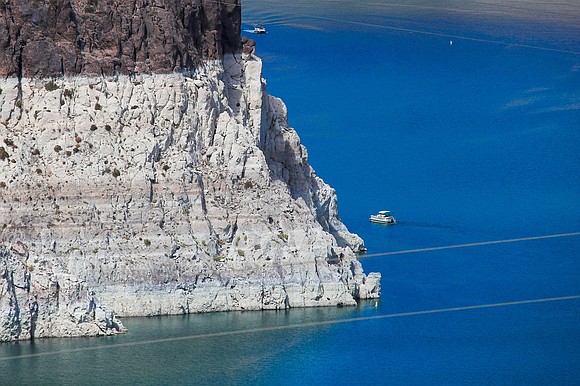Harris heads to rapidly draining Lake Mead to make the case for Biden's climate priorities
CNN/Stylemagazine.com Newswire | 10/18/2021, 11:58 a.m.

Originally Published: 18 OCT 21 11:27 ET
By Jasmine Wright
(CNN) -- Vice President Kamala Harris will visit Lake Mead in Nevada on Monday to make the case for Congress to fund "the largest investment in climate resilience in US history" by passing President Joe Biden's sweeping economic agenda, according to a White House official.
Harris' climate-focused event comes as the President's climate proposals inside the social safety next expansion package face a perilous future following reports that Democratic Sen. Joe Manchin of West Virginia has pushed back strongly on the Clean Electricity Performance Program, the cornerstone climate policy in the package.
Lake Mead, the country's largest reservoir, is experiencing a shocking climate change-fueled drought and is rapidly draining as CNN has previously reported. The Colorado River reservoir, which is just east of Las Vegas on the Nevada-Arizona border, is poised to become the focal point of one of the country's most significant climate crises: water shortages in the West.
Harris will receive a briefing on the lake's rapid decline from officials at the Department of the Interior, per the official, and will be joined by US Reps. Dina Titus, Susie Lee and Steven Horsford, all Democrats from Nevada.
Harris will later make remarks that are expected to "emphasize that water shortages have a ripple effect on our farmers, food supply, and economy -- and that climate change will continue to make extreme weather including droughts and heat more frequent, costly, and harmful," the official said.
Lake Mead and Lake Powell, which is upstream from Mead on the Colorado River, have drained at an alarming rate this year due to climate change-fueled drought. The two reservoirs fed by the Colorado River watershed provide a critical supply of drinking water and irrigation for many across the region, including rural farms, ranches and native communities.
In August, the federal government declared a water shortage on the Colorado River for the first time, triggering mandatory water consumption cuts for states in the Southwest, as climate change-fueled drought pushes the water levels at Lake Mead and Lake Powell to unprecedented lows.
The low water levels are also threatening power generation; the US Bureau of Reclamation announced in September there is a 3% chance that Lake Powell could drop below the minimum level needed to allow the lake's Glen Canyon Dam to generate hydroelectricity next year. In 2023, the chance of a shutdown grows to 34%, according to the projection.
The Colorado River Basin and much of the Southwest are in the midst of a climate change-fueled megadrought, which has stretched on for more than 20 years.
A study published in the journal Science in 2020 found that the period from 2000-2018 was the driest 19-year stretch since the late 1500s.
The dryness the region has experienced from 2020 and into 2021 is designated as exceptional -- the most severe level of drought -- in both the paleoclimate and historical records, according to a study published in September by the National Oceanic and Atmospheric Administration's drought task force.



